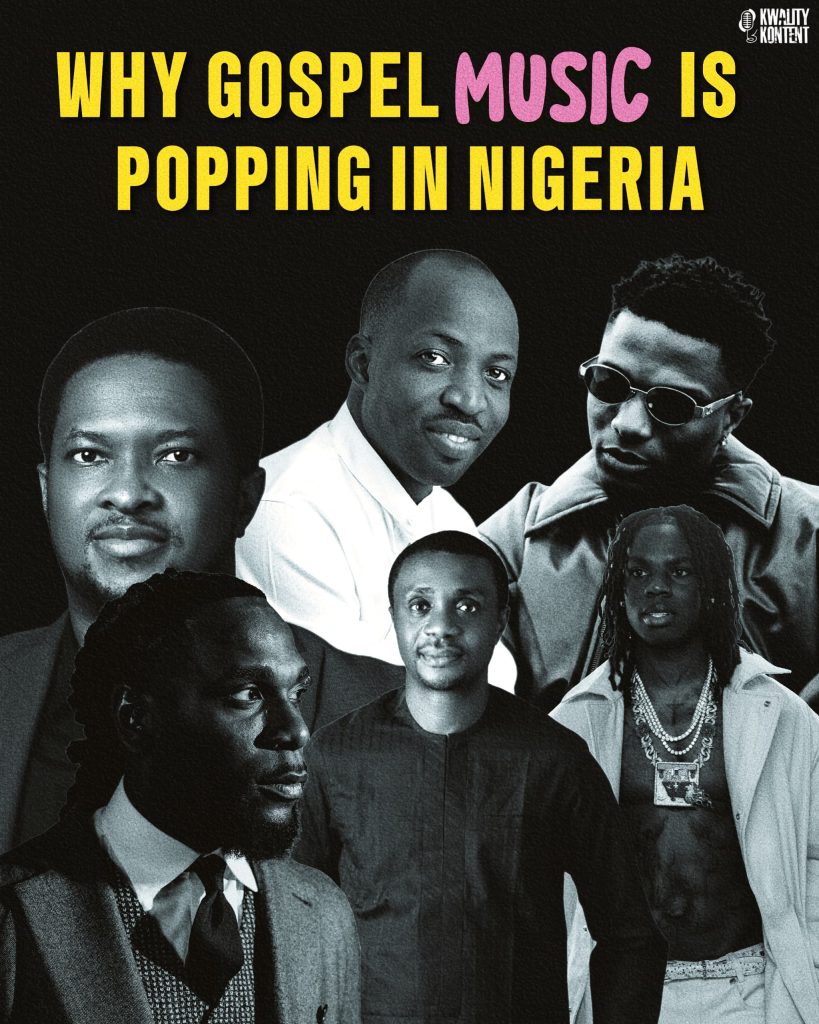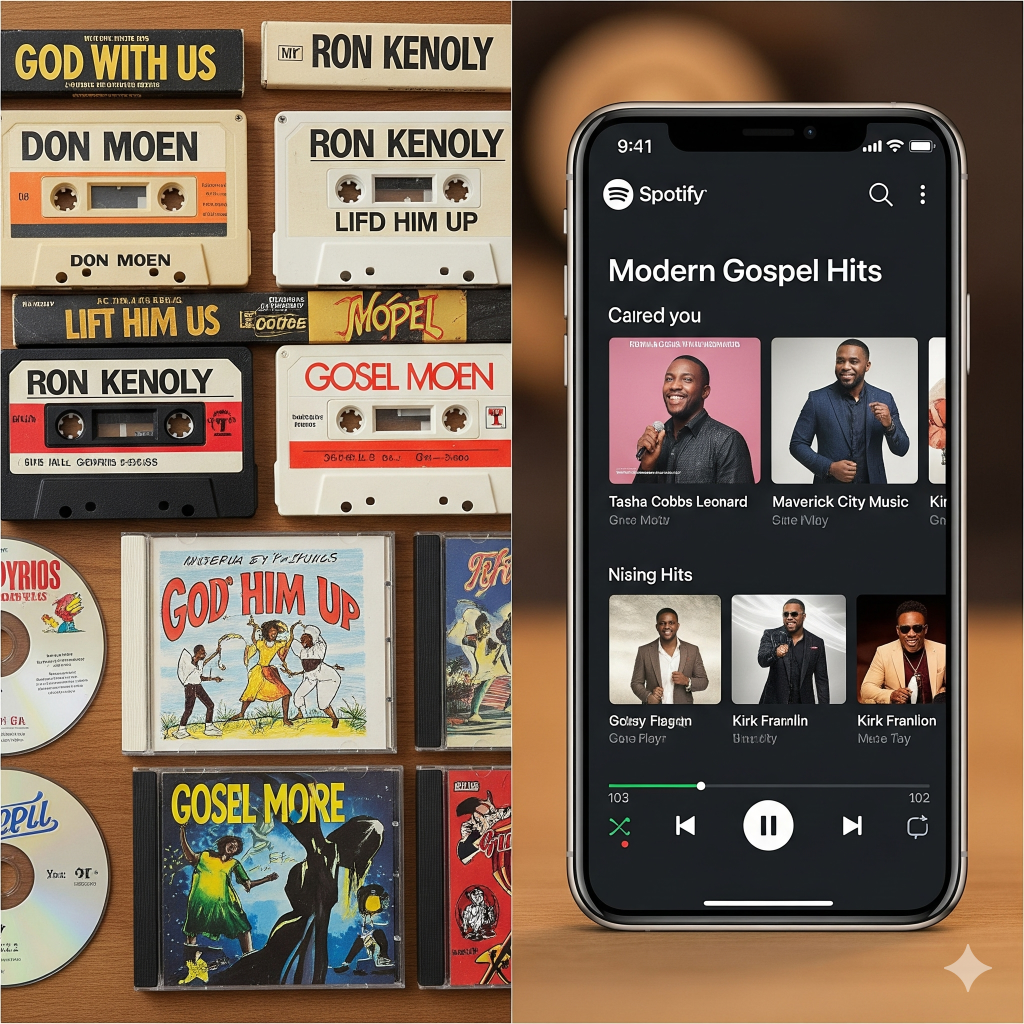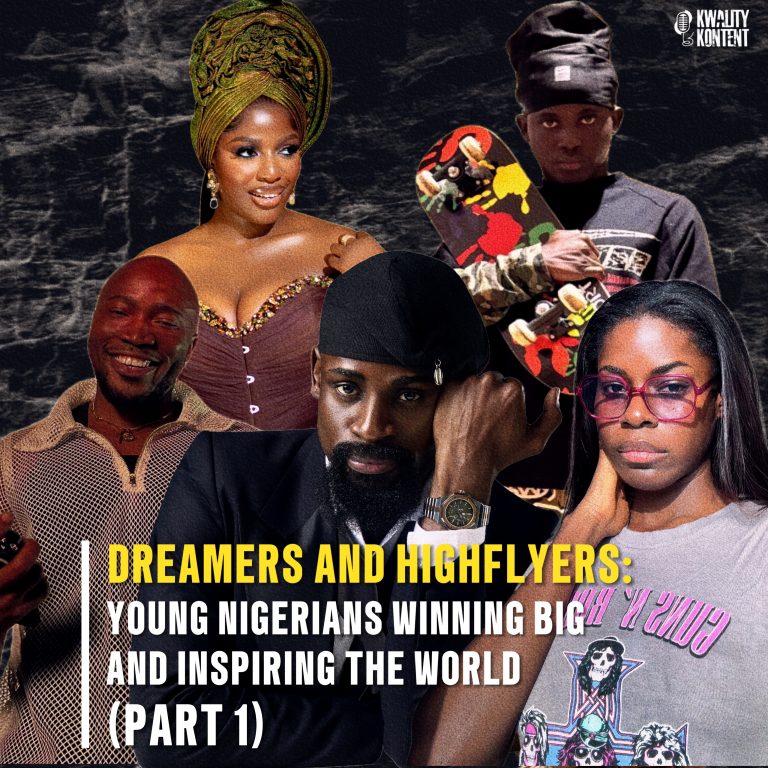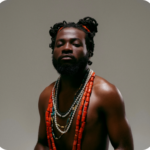
TurnTable’s latest edition of Industry Digest is out, and as always, it’s filled with the kind of data that makes music nerds adjust their glasses. Charts, stats, and breakdowns of the people who are running Nigerian music. This time, one thing jumps off the page louder than Pastor Adeboye’s “let somebody shout Hallelujah” – gospel music is popping in Nigeria.
Well, gospel music has always been popping in Nigeria. Most of us grew up in homes where Don Moen and Ron Kenoly were literally permanent tenants in our living room. What we’re seeing now is different. Gospel artists are not just leading praise sessions on a cold Friday night on the Lagos-Ibadan expressway, they’re now dragging space on the same charts as Wizkid, Rema, and Burna Boy.

Lawrence Oyor is the man leading the gospel awakening on the charts. His singles Favour (it surrounds me like a shield) and We Will Be Many (with Sound of Salem) didn’t just enter the Top 40, they stayed there like NYSC corpers at an orientation camp. Then came No Turning Back II with Gaise Baba, which stormed the charts at No. 4 and climbed to No. 2, making it the highest-charting gospel song in Nigeria..
It doesn’t stop there. Sound of Salem’s Dominion EP marched into the Official Top 100 Albums Chart, peaked at No. 17, and has refused to leave for 17 consecutive weeks, much longer than a lot of relationships in Lagos.
What does this mean? Well, it seems like gospel artists are no longer satisfied with church conferences and night vigils; they’re now dragging bragging rights with Afrobeats artists.
The question now is why?
1) Gospel Music Has Become Streaming Friendly

There was a time when gospel artists were not in any rush to get to the point. A single song could run for 14 to 20 minutes, with long instrumental breaks, multiple sermon-like interludes, and endless call-and-response. To put it in perspective, the length of one gospel song back then is like six songs on a Joeboy album.
While that worked perfectly in church settings or during morning devotions, streaming is a different beast. In today’s world where the average young person can barely stay with a song for three minutes before skipping, that model can’t survive. The newer generation of gospel acts understand this, and their music reflects it. The songs are sharper, catchier, and high in replay value.
But it’s not just about length; it’s about access. Back then, if you wanted gospel music, you had to actively go and find it. You had to buy the cassettes, borrow the CDs, or wait until Sunday service. Now the game has flipped. Gospel music is available on your favorite streaming platforms, sliding into your playlists right next to Wizkid and Burna Boy. Gospel artists are even creating TikTok challenges to go viral.
2) Gospel Music Actually Slaps Now
For the longest time, gospel music (especially in Nigeria) could feel repetitive and predictable. The lyrics, chord progressions, and even the instrumentals followed familiar patterns that you could almost guess the next note or lyric before it came. The songs often felt monotonous and boring. The length of the songs also didn’t help matters. Unless you were deeply religious and afraid to criticize anything involving God, you probably wouldn’t enjoy these songs.
But this new wave of gospel musicians know ball. They’re making music that is not only kingdom-focused and spiritual, but also exciting. Simply put: they are making bangers. Records like Gaise Baba’s No Turning Back, JJ Hairston’s Onaga, Prinx Emmanuel’s Who Goes That Man, Moses Bliss’s Miracle No Dey Tire Jesus. These songs don’t just minister, they vibe. The beats knock, the hooks stick, and the production quality has leveled up.
Take Moses Bliss for example. When he first dropped Daddy Wey Dey Pamper, it came as a 12-minute marathon complete with sermon interludes – the kind of song you needed small chops and water to survive. Then he went back, stripped it down, and returned with the Gbedu Version. This one had bounce, groove, lamba, and rhythm to fit into playlists outside the church. And guess what? That’s the version that blew up outside church circles.
It’s a perfect example of how gospel artists are learning to repackage their message without losing the spirit. This is why they are actually competing on the charts.
3) Nigeria Is Hard

Let’s be honest, one of the reasons why gospel music is booming right now is because Nigeria itself is booming with hardship. The economy is tighter than Lagos traffic and inflation is moving like Usain Bolt. Every week there’s a new government policy designed to humble your pocket. In times like this, people aren’t exactly excited to hear songs about popping champagne or catching flights; they want hope.
That’s why songs like Lawrence Oyor’s Favour resonate so deeply. The record carries simple, sing-along messages of comfort and offers you the reassurance you need when your salary buckles under the weight of relentless pressure from Tinubunomics.
Nigerians are grabbing onto anything that says things will get better, and gospel has always had that. Messages of divine favour, breakthrough, joy, peace, and a better tomorrow are embedded in its DNA. The difference now is that the music is polished enough to travel far beyond the church walls. So when life feels like a tragedy, gospel is stepping in as the soundtrack for hope and survival.







